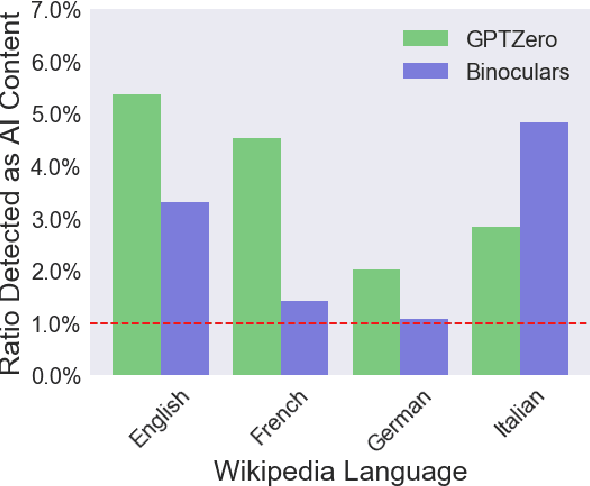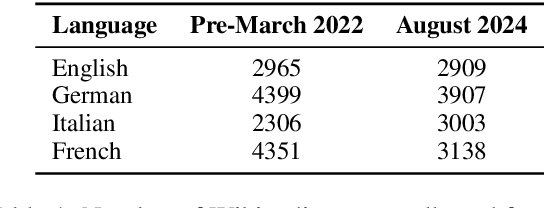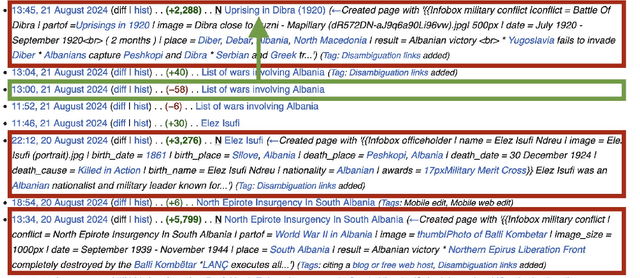Denis Peskoff
ResearchRubrics: A Benchmark of Prompts and Rubrics For Evaluating Deep Research Agents
Nov 10, 2025Abstract:Deep Research (DR) is an emerging agent application that leverages large language models (LLMs) to address open-ended queries. It requires the integration of several capabilities, including multi-step reasoning, cross-document synthesis, and the generation of evidence-backed, long-form answers. Evaluating DR remains challenging because responses are lengthy and diverse, admit many valid solutions, and often depend on dynamic information sources. We introduce ResearchRubrics, a standardized benchmark for DR built with over 2,800+ hours of human labor that pairs realistic, domain-diverse prompts with 2,500+ expert-written, fine-grained rubrics to assess factual grounding, reasoning soundness, and clarity. We also propose a new complexity framework for categorizing DR tasks along three axes: conceptual breadth, logical nesting, and exploration. In addition, we develop human and model-based evaluation protocols that measure rubric adherence for DR agents. We evaluate several state-of-the-art DR systems and find that even leading agents like Gemini's DR and OpenAI's DR achieve under 68% average compliance with our rubrics, primarily due to missed implicit context and inadequate reasoning about retrieved information. Our results highlight the need for robust, scalable assessment of deep research capabilities, to which end we release ResearchRubrics(including all prompts, rubrics, and evaluation code) to facilitate progress toward well-justified research assistants.
Remote Labor Index: Measuring AI Automation of Remote Work
Oct 30, 2025Abstract:AIs have made rapid progress on research-oriented benchmarks of knowledge and reasoning, but it remains unclear how these gains translate into economic value and automation. To measure this, we introduce the Remote Labor Index (RLI), a broadly multi-sector benchmark comprising real-world, economically valuable projects designed to evaluate end-to-end agent performance in practical settings. AI agents perform near the floor on RLI, with the highest-performing agent achieving an automation rate of 2.5%. These results help ground discussions of AI automation in empirical evidence, setting a common basis for tracking AI impacts and enabling stakeholders to proactively navigate AI-driven labor automation.
Good Intentions Beyond ACL: Who Does NLP for Social Good, and Where?
Oct 06, 2025Abstract:The social impact of Natural Language Processing (NLP) is increasingly important, with a rising community focus on initiatives related to NLP for Social Good (NLP4SG). Indeed, in recent years, almost 20% of all papers in the ACL Anthology address topics related to social good as defined by the UN Sustainable Development Goals (Adauto et al., 2023). In this study, we take an author- and venue-level perspective to map the landscape of NLP4SG, quantifying the proportion of work addressing social good concerns both within and beyond the ACL community, by both core ACL contributors and non-ACL authors. With this approach we discover two surprising facts about the landscape of NLP4SG. First, ACL authors are dramatically more likely to do work addressing social good concerns when publishing in venues outside of ACL. Second, the vast majority of publications using NLP techniques to address concerns of social good are done by non-ACL authors in venues outside of ACL. We discuss the implications of these findings on agenda-setting considerations for the ACL community related to NLP4SG.
Should I Trust You? Detecting Deception in Negotiations using Counterfactual RL
Feb 18, 2025Abstract:An increasingly prevalent socio-technical problem is people being taken in by offers that sound ``too good to be true'', where persuasion and trust shape decision-making. This paper investigates how \abr{ai} can help detect these deceptive scenarios. We analyze how humans strategically deceive each other in \textit{Diplomacy}, a board game that requires both natural language communication and strategic reasoning. This requires extracting logical forms of proposed agreements in player communications and computing the relative rewards of the proposal using agents' value functions. Combined with text-based features, this can improve our deception detection. Our method detects human deception with a high precision when compared to a Large Language Model approach that flags many true messages as deceptive. Future human-\abr{ai} interaction tools can build on our methods for deception detection by triggering \textit{friction} to give users a chance of interrogating suspicious proposals.
Personalized Help for Optimizing Low-Skilled Users' Strategy
Nov 14, 2024Abstract:AIs can beat humans in game environments; however, how helpful those agents are to human remains understudied. We augment CICERO, a natural language agent that demonstrates superhuman performance in Diplomacy, to generate both move and message advice based on player intentions. A dozen Diplomacy games with novice and experienced players, with varying advice settings, show that some of the generated advice is beneficial. It helps novices compete with experienced players and in some instances even surpass them. The mere presence of advice can be advantageous, even if players do not follow it.
The Rise of AI-Generated Content in Wikipedia
Oct 10, 2024



Abstract:The rise of AI-generated content in popular information sources raises significant concerns about accountability, accuracy, and bias amplification. Beyond directly impacting consumers, the widespread presence of this content poses questions for the long-term viability of training language models on vast internet sweeps. We use GPTZero, a proprietary AI detector, and Binoculars, an open-source alternative, to establish lower bounds on the presence of AI-generated content in recently created Wikipedia pages. Both detectors reveal a marked increase in AI-generated content in recent pages compared to those from before the release of GPT-3.5. With thresholds calibrated to achieve a 1% false positive rate on pre-GPT-3.5 articles, detectors flag over 5% of newly created English Wikipedia articles as AI-generated, with lower percentages for German, French, and Italian articles. Flagged Wikipedia articles are typically of lower quality and are often self-promotional or partial towards a specific viewpoint on controversial topics.
GPT Deciphering Fedspeak: Quantifying Dissent Among Hawks and Doves
Jul 26, 2024



Abstract:Markets and policymakers around the world hang on the consequential monetary policy decisions made by the Federal Open Market Committee (FOMC). Publicly available textual documentation of their meetings provides insight into members' attitudes about the economy. We use GPT-4 to quantify dissent among members on the topic of inflation. We find that transcripts and minutes reflect the diversity of member views about the macroeconomic outlook in a way that is lost or omitted from the public statements. In fact, diverging opinions that shed light upon the committee's "true" attitudes are almost entirely omitted from the final statements. Hence, we argue that forecasting FOMC sentiment based solely on statements will not sufficiently reflect dissent among the hawks and doves.
More Victories, Less Cooperation: Assessing Cicero's Diplomacy Play
Jun 07, 2024Abstract:The boardgame Diplomacy is a challenging setting for communicative and cooperative artificial intelligence. The most prominent communicative Diplomacy AI, Cicero, has excellent strategic abilities, exceeding human players. However, the best Diplomacy players master communication, not just tactics, which is why the game has received attention as an AI challenge. This work seeks to understand the degree to which Cicero succeeds at communication. First, we annotate in-game communication with abstract meaning representation to separate in-game tactics from general language. Second, we run two dozen games with humans and Cicero, totaling over 200 human-player hours of competition. While AI can consistently outplay human players, AI-Human communication is still limited because of AI's difficulty with deception and persuasion. This shows that Cicero relies on strategy and has not yet reached the full promise of communicative and cooperative AI.
The Prompt Report: A Systematic Survey of Prompting Techniques
Jun 06, 2024Abstract:Generative Artificial Intelligence (GenAI) systems are being increasingly deployed across all parts of industry and research settings. Developers and end users interact with these systems through the use of prompting or prompt engineering. While prompting is a widespread and highly researched concept, there exists conflicting terminology and a poor ontological understanding of what constitutes a prompt due to the area's nascency. This paper establishes a structured understanding of prompts, by assembling a taxonomy of prompting techniques and analyzing their use. We present a comprehensive vocabulary of 33 vocabulary terms, a taxonomy of 58 text-only prompting techniques, and 40 techniques for other modalities. We further present a meta-analysis of the entire literature on natural language prefix-prompting.
 Add to Chrome
Add to Chrome Add to Firefox
Add to Firefox Add to Edge
Add to Edge